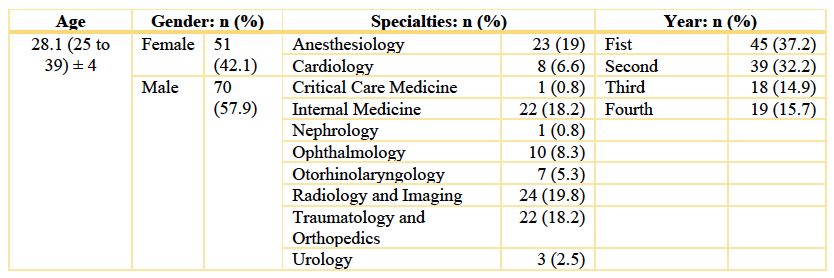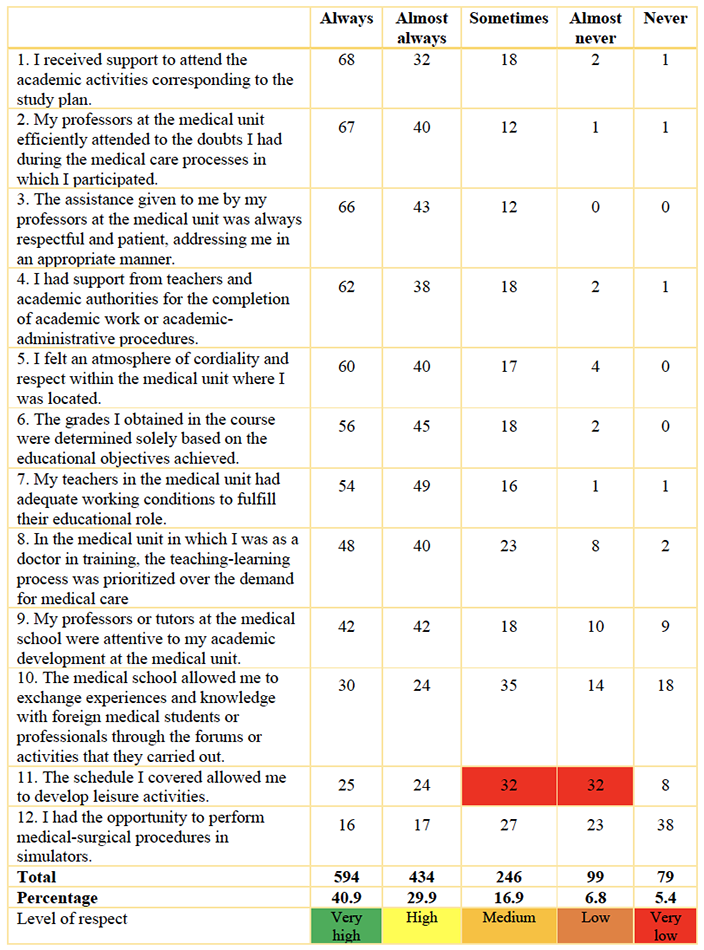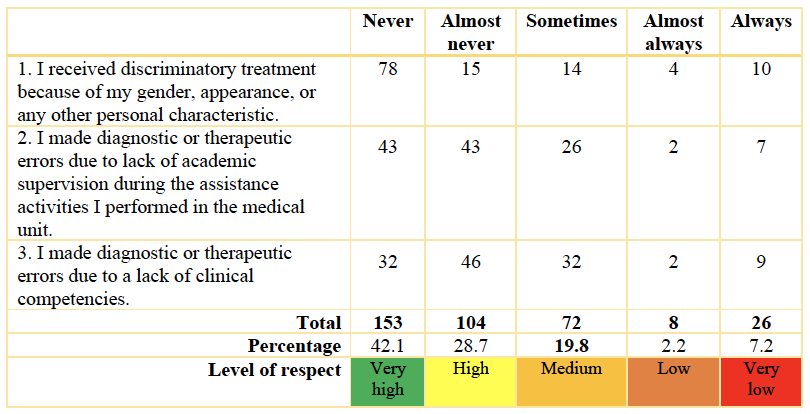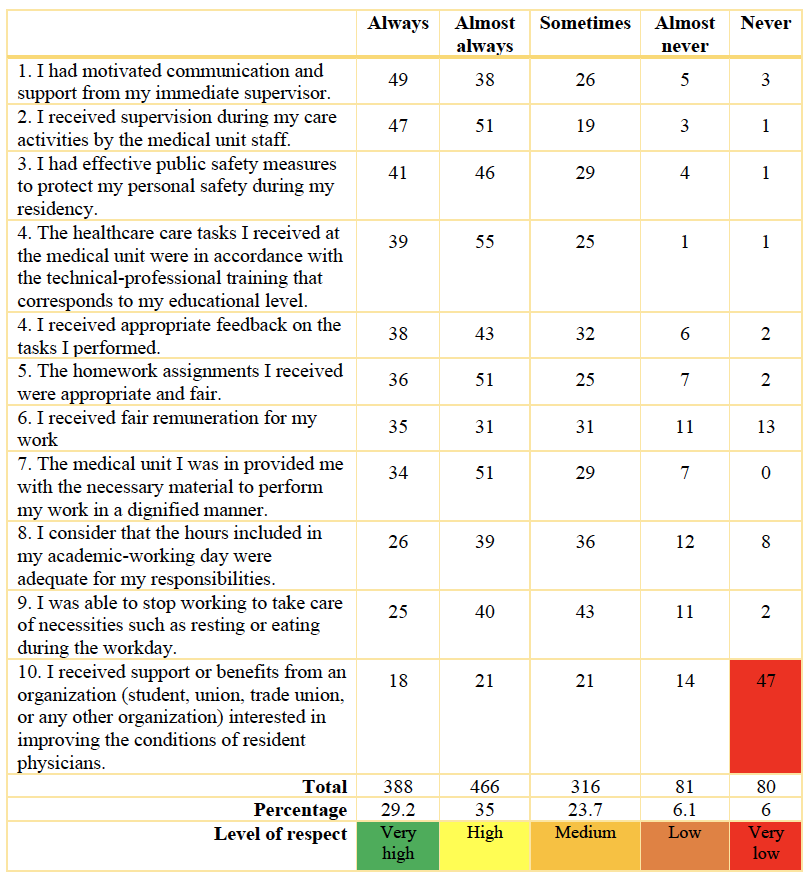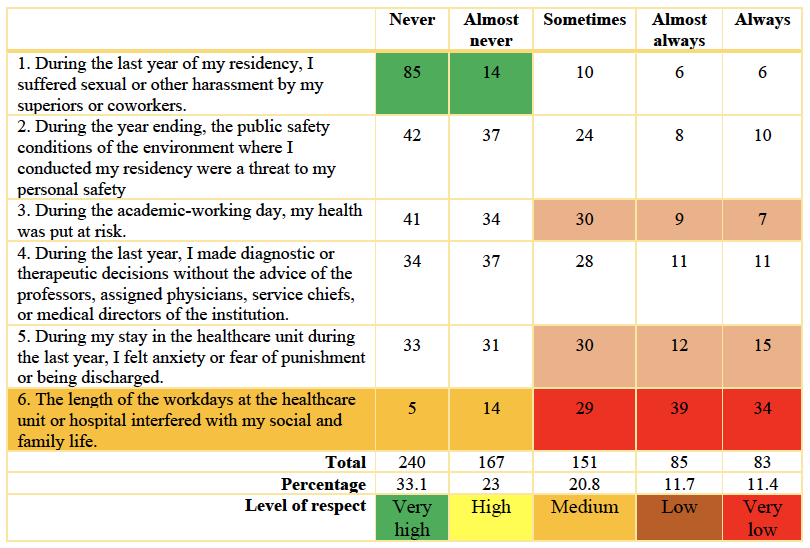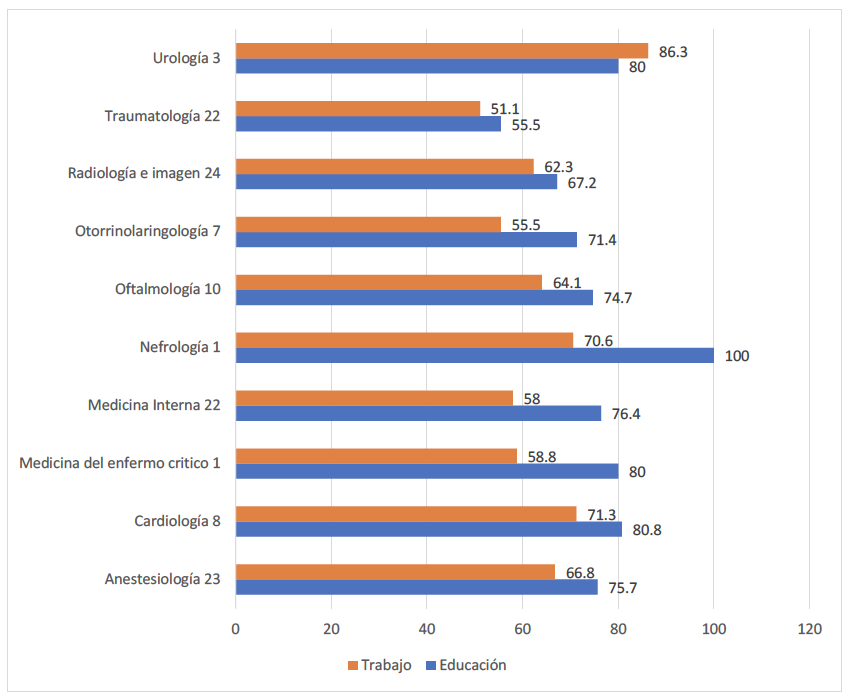Introduction
The well-being of medical residents is vital as they function in multiple roles as trainees, teachers, and patient care providers within the clinical setting. These roles require them to interact daily with numerous people and subject them to many stressors and pressures that, in turn, affect their well-being and how they care for patients. Adverse stressors may take the form of bullying, harassment, or discrimination (1). The 2018 National Resident Survey in Canada reported that 78.2% of all residents experienced at least one form of bullying or harassment in the previous year (2). The most frequent types of unwanted behaviors reported by residents included inappropriate verbal comments (3) and working as punishment (4). The sources of these acts have been the staff physicians, nurses, and other health care professionals (5), and other resident physicians have also been reported (6).
Psychological abuse, gender discrimination, sexual harassment, physical abuse, homophobia, and racial discrimination are common problems during residency training (7). About 50% of residents report psychological abuse (8). A study in the United States described how women attending their hospital internships perceived discrimination during training and those who suffered this type of violence were medical school students (87%), resident physicians (88%), and interns (91%). These results suggest that harassment and discrimination are commonplace and that complaint mechanisms are inadequate or insufficient (9). The above-mentioned studies describe the proportion of circumstances transgressing human rights in students and are studies of "educational practices" in first world countries, where the quality of education is higher than in developing countries. So, what should be expected in developing countries? On the other hand, "Medical education from a human rights-based approach to health" (10), evaluated from a human rights-based approach to health by the World Health Organization (11), shows in a concrete and articulated way the value of the rights to education and decent work, in addition to the right to health of the population (12).
In the educational-labor environments, reciprocal actions are generated among the main actors and situations that facilitate the violation of the human rights of the trainees (13). The ambiguities that are exhibited in the norms that regulate undergraduate and graduate educational-labor plans propitiate environments that violate their universal rights (14).
International efforts to protect health by promoting human rights and recognizing the many determinants of health have evolved over more than half a century (15). We employed in our work the instrument developed by Vázquez Martínez et al. (10) to assess the point of view of our resident physicians.
This instrument has 32 items: 15 for the right to education and 17 for the right to decent work. Favorable events are those in which their rights were respected and unfavorable events indicate abuse of these rights. The instrument of Vázquez Martínez et al. (10) has an overall Cronbach's alpha of 0.931, and by dimension, it was 0.887 for the right to education and 0.869 for the right to decent work.
Each item has five possible responses (always, almost always, sometimes, almost never and never) and is scored inversely (favorable: always = 4 and never = 0; unfavorable: always = 0 and never = 4) (10). The maximum score of the instrument, which translates to 100% respect, is 128 points per resident (60 for respect for the right to education and 68 for respect for the right to decent work). The score of the events makes it possible to detect what should be promoted or what should be eradicated (10).
Methodology
This research consisted of a descriptive-cross-sectional study, in which, from April to May 2021, a questionnaire with the instrument of the author Vázquez Martínez et al. (10) was sent electronically with Google Docs, completely anonymously to a group of 225 resident physicians of different specialties of the Hospital de Especialidades 2. A total of 145 residents (64%) responded, 24 surveys (16%) were eliminated for being incomplete, and 121 (83%) were included. We asked about variables such as age, gender, year of residency, and specialty. Descriptive statistics with measures of central tendency and dispersion were performed.
Results
The average age was 28.1 years (range 25-29). There were more men (n = 70; 57.9%) than women (n = 51; 42.1%). In terms of year of residency, first-year residents were 45 (37.2%); second-year residents, 39 (32.2%); third-year residents, 18 (14.9%); and fourth-year residents, 19 (15.7%). By specialty, anesthesiology was represented by 23 residents (19%), cardiology by 8 (6.6%), critical medicine by 1 (0.8%), internal medicine by 22 (18.2%); nephrology by 1 (0.8%); ophthalmology by 10 (8.3%); otorhinolaryngology by 7 (5.8%); radiology and imaging by 24 (19.8%); traumatology and orthopedics by 22 (18.2%); and urology by 3 (2.5%). See Table 1.
70.8% of respondents perceive their favorable education rights as high and very high; in contrast, 29.1% perceive them as medium to very low. In relation to favorable decent work, 64.2 % perceive it as high and very high; in contrast, 35.8 % perceive it as medium to very low (Table 2).
Table 2 Level of respect and favorable rights in education and dignified work in 121 resident physicians

Regarding the respectful treatment given by the teachers to the residents, this was weighed at high and very high levels, while the opportunity to perform medical-surgical procedures in the simulators was considered at low or very low levels (Table 3).
In the case of unfavorable events affecting their right to an education, 70.8% of surveyed residents rated it as high or very high, while 29.2% rated it as medium to very low (Table 4).
As to favorable events regarding the right to decent work, 64.2% of residents rate them as high to very high, and 35.8% perceive them as medium to very low (Table 5).
Concerning unfavorable events regarding the right to decent work, 56.1% perceived them as high or very high, while 43.9% perceived them as medium to very low (Table 6).
When describing comparatively the perception of favorable events by specialty, we found that traumatology and orthopedics were characterized by lower perceived weights in relation to the other medical specialties (Figure 1).
When Pearson's χ² was applied to evaluate the significant difference between the percentages of perception of favorable educational and work events by gender, no significant difference was found, with a value of p = 0.877 (p = 0.05). Similarly, the analysis was carried out for the different specialties and the perception of favorable events in these two items, without finding significant differences. There was a value of p = 0.8498 (p = 0.05).
Discussion
This survey had a response rate of 64% of the resident physicians to whom it was sent. In the demographic variables, the age in this series was similar to that described by Vázquez Martínez et al. (10): 29.8 years. The male gender (57.9%) was lower than that described by Vázquez Martínez: 78.5%. The degrees of residency were similar to those also described by Vázquez Martínez: first year (R1): 42%; R2: 23%; R3: 28%, and R4: 6%. We found R1: 37.2%; R2: 32.2%; R3: 14.9% and R4: 15.7%. According to our survey, slightly more than three quarters felt that, in general, their rights to education and decent work were at high to very high levels of respect, better than that described by Vázquez Martínez et al. in a sample of 605 physicians; the majority described a medium or high level of respect (10) while, separately, in our series, respect for the right to education (70.8%) and decent work (61.3%) was higher than reported, with 58% for education and 57% for decent work.
In the favorable event of the right to education, that related to the respectful treatment given by the teachers to the residents was considered as high and very high in general; however, the opportunity to perform medical-surgical procedures in the simulators was weighed as low or very low, similar to that described by Vázquez Martínez et al. (10). Item 11 of Table 3 asks whether the schedule covered allows for leisure activities. This was weighed from medium to low, indicating that work schedules reduce the possibilities for leisure, similar to that reported by Vázquez Martínez et al. (10). This has repercussions on the social, family, and academic lives of the residents.
Currently, educational programs and strategies are obsolete. The evolution in educational paradigms exceeds the strategies prevailing in hospital clinical settings; however, not only do educational changes point out the incongruence in the way of educating our residents, but also in the dissemination and knowledge of the Universal Declaration of Human Rights and the recognition of various labor rights. Nor was there the knowledge of the effect on mental health, as there is today.
Excessive workload has serious repercussions for students. In terms of restorative sleep (2,3), its impact on mental health (stress, depression, anxiety, among others) is clearly noted (4,5). Undoubtedly, shifts of up to 36 continuous hours affect physical and mental health (6). On the other hand, the participation of the university in these aspects was rated as low to very low, and this is a call for attention to the educational institutions that endorse postgraduate degrees in medicine so that they offer a greater commitment and participation in their training.
There are laws, regulations, and norms that regulate the rights of resident physicians; however, they are still insufficient to guarantee that their labor and universal rights are respected.
When comparing between specialties on the perception of favorable events in education and work in general, we found that traumatology and orthopedics were characterized by perceiving lower weights with reference to the other medical specialties. However, no statistically significant differences were found between medical specialties or between genders.
Conclusion
Our survey presented some demographic variables similar to the study that served as the basis for us to replicate its instrument in a sample of our resident physicians. Three-quarters of our respondents felt that, in general, their rights to education and dignified work were at high to very high levels of respect. In the favorable event of the right to education, that related to respectful treatment of residents by teachers was rated high and very high. The opportunity to perform medical-surgical procedures in the simulators was weighed as low or very low.
Likewise, there is a need for a greater commitment on the part of the universities that endorse the courses, given that there is no real commitment. In the opinion of our respondents, the time overload reflects the effect of excessive scheduling demands and its impact on their social, family, and academic life. Our results, compared with the previous study by Vázquez Martínez et al. (10), showed some areas of similarity; but the general perception of favorable events for education and decent work was weighed at higher levels than those of the same author. Even with the above, the existing rules, regulations, and laws are incapable of guaranteeing respect for the labor and educational rights of resident physicians in training.











 texto em
texto em 


